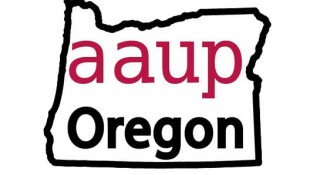2016 AAUP-OR Annual Meeting: celebrating progress and mapping the road ahead
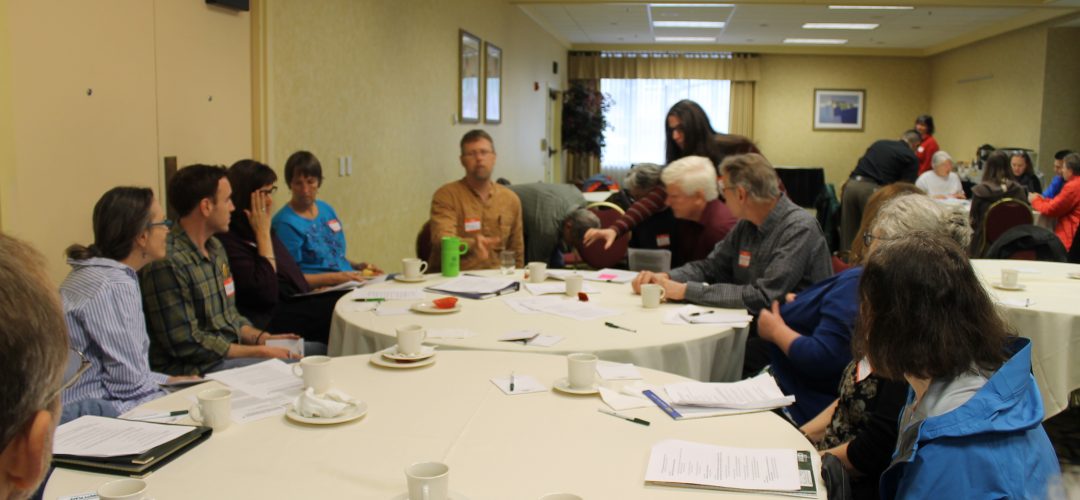
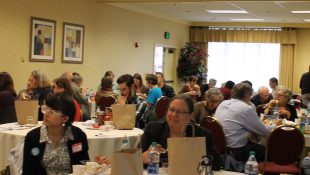
by Margaret Butler, Executive Director
Faculty activists from around the state gathered at University Place Hotel at Portland State on April 23rd to share ideas, build relationships, and unite around an exciting common agenda.
Our Movement’s Work the Last 12 Months, Directions for the Future:
We started the day with a plenary panel outlining what had been accomplished on goals articulated at our 2015 annual meeting. Various leaders reported on the work on our priorities—the Board of Trustees Relations Task Force, the committee focused on university spending priorities and how to increase the amount spent on university missions, our legislative work, and the work of our chapters.
We broke into discussion groups to delve deeper into our work on the Board of Trustees project, our legislative work, and our work on budgets. Each breakout group generated new energy and ideas and brought a report back to the closing plenary. Attendees were most interested in the 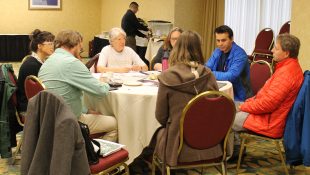 Board of Trustees project and many faculty members signed up to become engaged in an ongoing way. The legislative breakout group also focused on the BOT project. Each group had a rich discussion which leaves us with many ideas to incorporate into our work in each area.
Board of Trustees project and many faculty members signed up to become engaged in an ongoing way. The legislative breakout group also focused on the BOT project. Each group had a rich discussion which leaves us with many ideas to incorporate into our work in each area.
Connecting with the Grassroots:
Our next plenary session focused on organizing, both internal and external. We heard reports from faculty leaders at PSU-AAUP and United Academics of the UO about the success of their internal organizing programs. Both local unions have increased their membership numbers and established stronger structures to engage with members and potential members in their departments. We also heard from a PSU graduate student who shared the Graduate Employee Union’s plan for gaining card check recognition for their new union this spring. This brings 800 newly organized members into a union that is, like United Academics, jointly affiliated with AAUP and AFT. Finally we heard from our VP for Membership and Organizing about advocacy chapter work at private colleges around Oregon, along with a brief update from the Willamette University chapter president about the issues facing faculty there and their organized response.
The Unions of Academic Workers as a Force for Racial Justice at the University:
As we ate 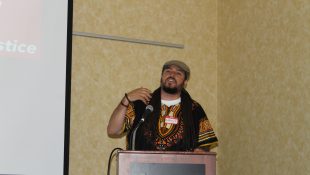 lunch, we were privileged to hear from Dr. Anthony Ratcliff, a member of the faculty in the department of Pan-African Studies at California State University-Los Angeles. Dr Ratcliff is a leader in the California Faculty Association and the LA Black Lives Matter movement. Dr Ratcliff spoke about the importance of social justice unionism and the sparks of rebirth. He lifted up the Chicago Teachers’ Union and the way they framed their campaign in the community’s interests as well as their own and the massive and successful day of action that included a teacher strike. The march that day was led by Black Lives Matter activists. He went through some of the recent issues behind the Black Lives Matter movement and the student protests and faculty’s stake in standing as allies with the activists. He encouraged us to build social justice unionism and stand up for racial justice.
lunch, we were privileged to hear from Dr. Anthony Ratcliff, a member of the faculty in the department of Pan-African Studies at California State University-Los Angeles. Dr Ratcliff is a leader in the California Faculty Association and the LA Black Lives Matter movement. Dr Ratcliff spoke about the importance of social justice unionism and the sparks of rebirth. He lifted up the Chicago Teachers’ Union and the way they framed their campaign in the community’s interests as well as their own and the massive and successful day of action that included a teacher strike. The march that day was led by Black Lives Matter activists. He went through some of the recent issues behind the Black Lives Matter movement and the student protests and faculty’s stake in standing as allies with the activists. He encouraged us to build social justice unionism and stand up for racial justice.
Action Workgroups: After lunch, we broke into three workshops to focus on action ideas. The first group, facilitated by Reshmi Dutt-Ballerstadt, looked at how students and faculty can form a united front for a racially just university. That group was very large, so it divided into three groups for discussion. We had attempted to get students and faculty members to come in pairs from all of our affiliated chapters. We were not able to get students from every campus, but we did have students from PSU and Linfield as part of the discussions. The groups came up with many recommendations for what faculty unions can do to stand up for racial justice on their campuses and in their communities.
The second action group was an introduction to non-violent direct action led by D Pei Wu, the Executive Director of Portland Jobs with Justice. They shared six steps of non-violent social change, with reference to past impactful social movements and fourteen principles of direct action.
The third group focused on communication around the budget issues. Kari Koch, a communications consultant who has worked with PSU-AAUP in the past, led the workshop. She had us look at how to message our budget priorities to the Board of Trustees. Workshop participants agreed that it was easy to figure out what the priorities are, but moving the decision-makers is a much harder job. It was clear that we need to have much more time and discussion to craft a campaign around budget priorities.
At the end of the day, we came back together to pull all the discussions together. In the next few weeks, we will digest the notes and put together strategy papers and action items to discuss at our summer Executive Committee meeting. Thanks to all who participated!

